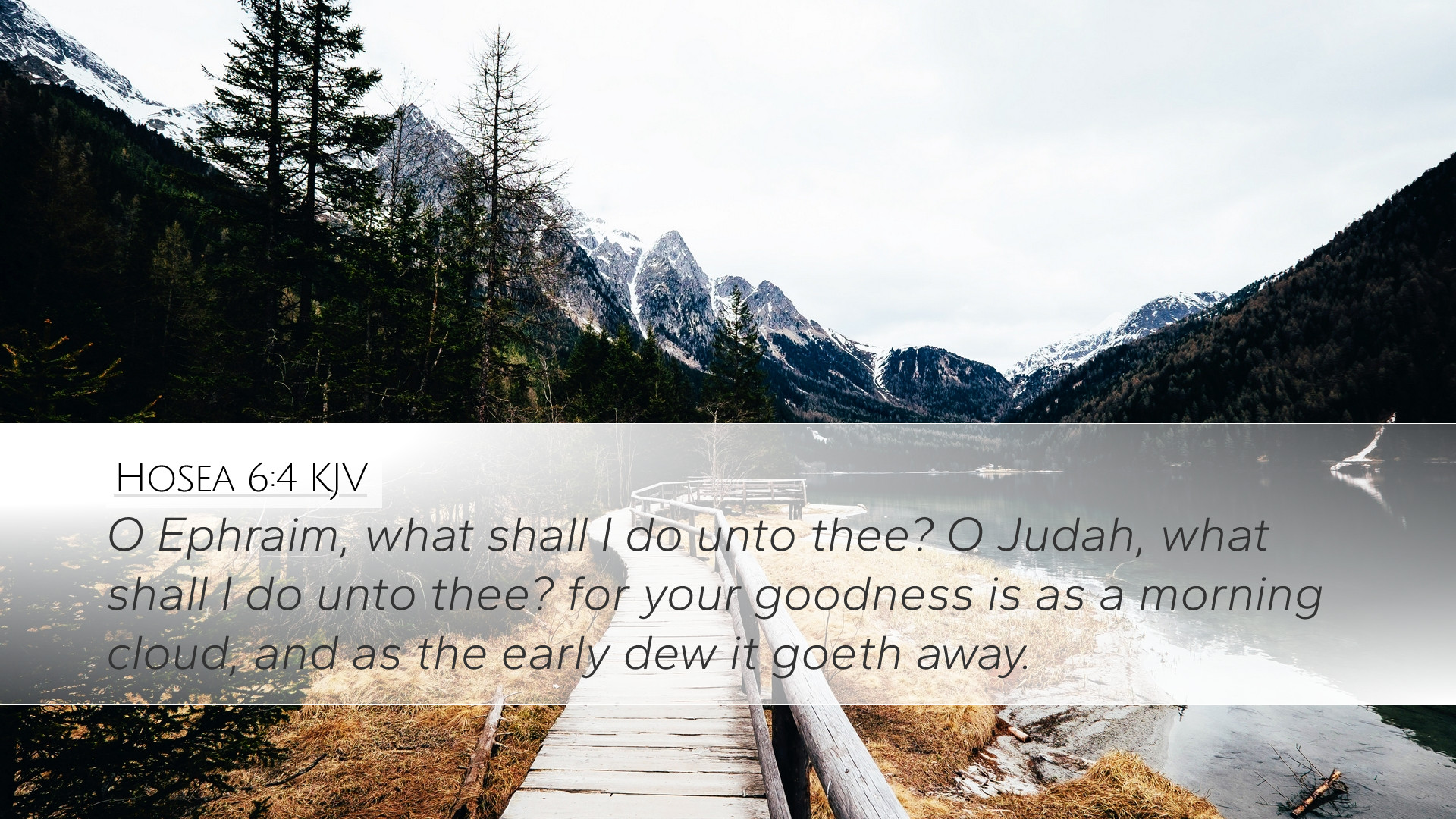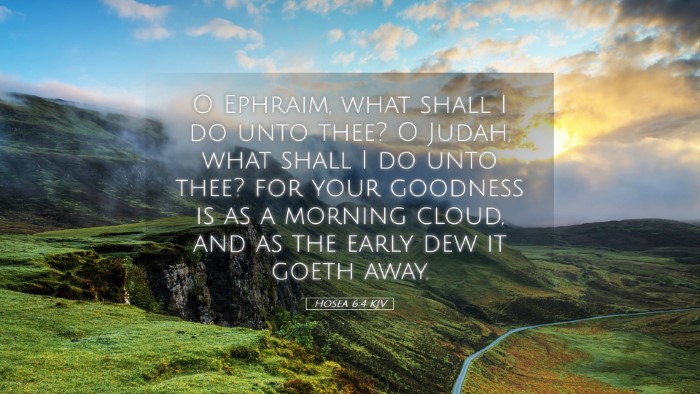Old Testament
Genesis Exodus Leviticus Numbers Deuteronomy Joshua Judges Ruth 1 Samuel 2 Samuel 1 Kings 2 Kings 1 Chronicles 2 Chronicles Ezra Nehemiah Esther Job Psalms Proverbs Ecclesiastes Song of Solomon Isaiah Jeremiah Lamentations Ezekiel Daniel Hosea Joel Amos Obadiah Jonah Micah Nahum Habakkuk Zephaniah Haggai Zechariah MalachiHosea 6:4
Hosea 6:4 KJV
O Ephraim, what shall I do unto thee? O Judah, what shall I do unto thee? for your goodness is as a morning cloud, and as the early dew it goeth away.
Hosea 6:4 Bible Commentary
Commentary on Hosea 6:4
Hosea 6:4 states: "O Ephraim, what shall I do unto thee? O Judah, what shall I do unto thee? For your goodness is as a morning cloud, and as the early dew it goeth away." This verse poignantly captures the heart of God towards His people as well as the nature of their spiritual state. Delving into this passage through the lens of various public domain commentaries can shed light on its deeper meanings and implications.
Contextual Overview
Historical Background: Hosea prophesied in a turbulent period of Israel's history characterized by rampant idolatry, social injustices, and a disregard for God’s covenant. Ephraim, representing the northern kingdom, was particularly known for its unfaithfulness, while Judah represented the southern kingdom. This division highlights the collective struggle of God’s people.
Analysis of Key Phrases
The prophet's rhetorical questions are not merely inquiries but reveal a deep emotional concern. The phrasing "what shall I do unto thee?" expresses God’s frustration with the people's repeated infidelities and their hollow attempts at righteousness.
Their Goodness as a Cloud
Hosea's metaphor of their goodness as a “morning cloud” signifies how fleeting and insubstantial their devotion to God is. This imagery is supported by the insights from Matthew Henry, who explains that just as morning clouds dissipate with the heat of the day, so too does the people's piety evaporate under the trials and temptations of life.
The Early Dew
Moreover, the “early dew” symbolizes a momentary freshness that quickly vanishes. Albert Barnes emphasizes that the people’s affections are superficial; they appear to offer something to God but lack true substance. Their superficial worship fails to produce lasting spiritual fruit, reflecting a broader theme of God's longing for genuine relationship over mere ritual.
Theological Implications
This passage resounds with theological themes that resonate deeply with contemporary believers:
- Covenant Faithfulness: God’s consistent commitment to His covenant despite Israel’s unfaithfulness is a crucial theme. Adam Clarke highlights that God's willingness to forgive and restore is paramount, yet it rests upon the people's genuine repentance.
- The Nature of True Worship: This verse compels believers to reflect on the nature of their worship. Are we offering God a fleeting devotion that easily fades away, or a steadfast commitment that endures?
- Divine Patience and Longing: God's repeated questioning underscores His patience and desire for authentic relationship rather than perfunctory actions. The emotional weight of these questions reveals the heart of God, longing for reconciliation and intimacy with His people.
Practical Applications
For pastors, students, theologians, and Bible scholars, this passage and its commentary provide significant practical insights:
- Self-Examination: Believers are called to regularly evaluate the authenticity of their faith. Hosea’s questions beckon a personal audit of the sincerity behind one’s worship and commitments.
- Teaching on God's Character: This verse can serve as a powerful lesson on God’s character, sparking discussions on divine love, grace, and the expectations God has for His people.
- Encouraging Genuine Repentance: Ministers can use this passage when teaching about repentance, emphasizing God's readiness to forgive when approached with a contrite heart.
Concluding Thoughts
Hosea 6:4 invites its audience to ponder the stark contrast between God's enduring nature and human frailty. As God looks upon His people with questions filled with longing and disappointment, He calls them—and by extension, us—toward deeper integrity in our faith and relationship with Him. The insights from commentaries deepen our understanding of this passage, urging believers to pursue a more authentic, steadfast faith that does more than flicker as does the morning cloud or the early dew.


